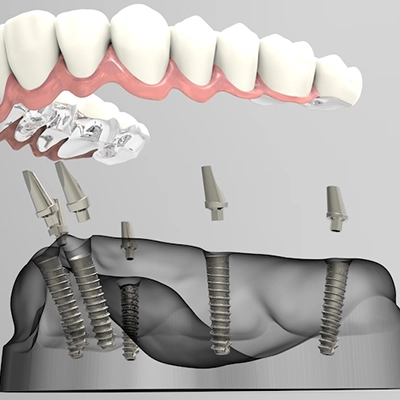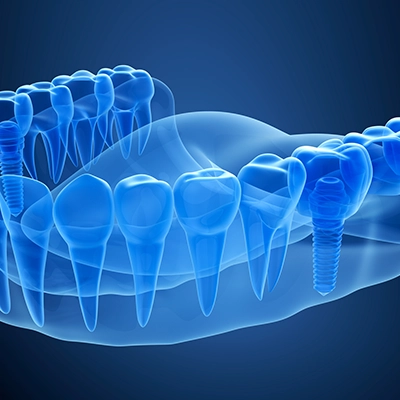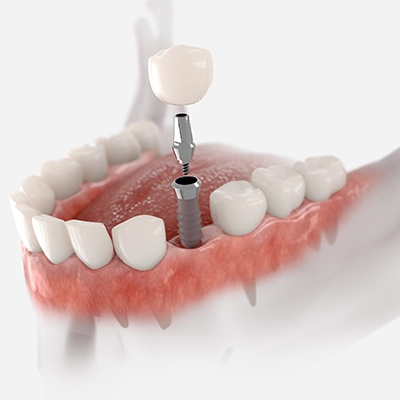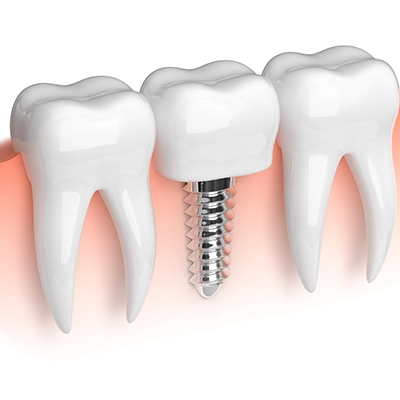LEARN ABOUT OUR SAFETY COMMITMENT
Menu
- New Patients:
- 727-219-1369
- Current patients:
- 727-494-7179
Menu
According to the American Dental Association, millions of adults are missing one or more teeth. Several causes include genetics, gum disease, and injury/trauma. However, no matter what causes the missing teeth, there are many complications that can occur including shifting, bone loss, difficulties eating or speaking, gum disease, irregular bite, and more.
The New Port Richey, Florida team offers several tooth replacement options. The most popular one is dental implants because they look, feel, and function like natural teeth. Replacing your missing teeth prevents those complications and protects your oral and overall health.
Dental implants are the gold standard of tooth replacement. While other tooth replacement options sit on top of the gums, the dental implant is placed in the jawbone, replacing the missing tooth’s look, feel, and function.


Sometimes, the permanent teeth never form due to a malformation of the upper or lower jawbone. This condition is known as tooth agenesis and can occur with certain genetic conditions including Down Syndrome and cleft palate and lip.
Missing 1 to 5 permanent teeth
Missing 6 or more permanent teeth
Missing all permanent teeth
Injury or trauma can cause a tooth to be knocked out. If addressed immediately, the dentist may be able to reinsert the tooth. However, this must be done within 30 minutes.
Gum disease causes spaces, or pockets, to form between teeth and gums. This leads to tooth decay, gum recession, and jawbone deterioration, which results in tooth loss.
Gingivitis is a mild form of gum disease and is characterized by inflammation, redness, and bleeding. Proper dental care and oral hygiene habits can reverse the condition at this point. However, if left untreated, it could progress to periodontitis, which requires extensive treatment.
There are a few additional factors that can cause tooth loss, including:
There are several problems that could be caused by missing teeth:

Missing teeth can cause a patient to develop a slur or lisp depending on the location of the gap. Eating may also be difficult. Missing front teeth can make it difficult to bite into foods and missing molars can make it difficult to chew. Patients who are missing several teeth may lose weight or experience malnutrition because it’s so difficult to eat.
When you have a space between your teeth, the neighboring teeth will naturally shift to fill it. This makes it harder to clean teeth, allowing bacteria and plaque to build up. This can lead to tooth decay and other oral health problems.
When your teeth shift, you develop an irregular bite, also known as malocclusion. This can lead to headaches and TMJ, as well as increase nighttime bruxism.
In order to remain healthy, your jawbone requires stimulation. Your tooth roots provide that stimulation. When you are missing a tooth, the jawbone is no longer getting that stimulation, so it will begin to deteriorate.
When a tooth is missing, bacteria can get into the gum pocket, which can lead to gum disease. This is the primary cause of serious and even deadly conditions spreading to other parts of your body.

A standard dental implant is made up of three pieces: implant screw, abutment, and prosthetic tooth. The implant screw is implanted in the jawbone, which becomes like a tooth root. The prosthetic tooth replaces the crown of the tooth, or the visible portion above the gum line. The abutment connects the two, securely holding the tooth in place.
There are several steps involved in the dental implant process. This process usually takes several months to a year or more, depending on your body’s ability to heal. Here’s what you can expect before, during, and after implant placement.
The first step in the process is the consultation. During this appointment, the dentist will examine your mouth and take x-rays to determine if implants are right for you. We will discuss your oral and overall health history, your oral hygiene habits, and your expectations for treatment. This information will be used to create your personal treatment plan.
If you need additional procedures, such as extractions, bone grafting, or gum disease treatment, those will be completed first. In most cases, you’ll need time to heal before the implants can be placed with the exception of extractions. Depending on the condition of your mouth, the implants may be placed at the same time.

There are several surgical steps that must be completed:
First, the implant screw will be placed in the jawbone. This involves making an incision in the gum and drilling a hole in the jawbone. The incision will be closed, and you will be sent home to heal.
Once the jawbone has healed around and fused with the implant, you will return to have the abutment placed. This involves opening the incision to expose the implant and attaching the abutment. A healing cap is placed on top to allow the gum to heal without covering the abutment. This is what connects the prosthetic tooth to the implant screw.
At this time, you will choose and order your prosthetic tooth and an impression will be made to send to the dental lab. This takes a couple of weeks.
Once the dental lab sends your prosthetic tooth to the clinic, we will schedule your appointment to have it placed. First, we will check it for proper fit. Then, if everything looks and feels right, we will secure it in place.
Aftercare varies depending on the stage of the process you are in. You will want to stick to a liquid diet for the first few days following implant surgery. Then, you may transition to a soft food diet when you feel ready. You’ll want to stick to soft foods until osseointegration has occurred.
Once the prosthetic tooth is in place, you do not need to follow any special aftercare instructions. Simply brush and floss your teeth to prevent bacteria and plaque from building up and causing complications.
For healthy patients, dental implants have a 95% success rate. There are a few things that impact the success or failure of dental implants, but you can take steps to reduce your risk:
All of these can reduce your risk of losing the implant through implant failure.
If you are missing one or more teeth, consider scheduling a consultation with the team at Precision Dental. We are located on Rancho del Rio Drive in New Port Richey. Our office hours are Monday through Friday from 9:00 AM to 5:00 PM and Saturday from 9:00 AM to 1:00 PM. We can help you restore your smile and get your confidence back.
Below are some of the most frequently asked questions at Precision Dental in New Port Richey, FL. If you have any additional questions or concerns, please let us know and we will be glad to address those with you.
Dental implants are designed to last a lifetime, with proper care and maintenance. This includes brushing twice daily, flossing once, and visiting the dentist for an exam and cleaning every 6 months.
Local anesthesia is administered for the surgery, so you won’t feel any pain. You may have some discomfort when the anesthesia wears off and as your jawbone heals around and fuses with the implant. However, this is only mild discomfort and you should be able to keep it under control with OTC pain relievers.
If you need help with your dental implants, speak with our friendly office staff. We will work with your dental insurance provider to determine your coverage. We also have some financing options that we can explain to help make paying for your implants more manageable.
Dental implants replace the entire tooth structure. The implant screw is inserted in the jawbone and the prosthetic tooth replaces the visible portion of the tooth. This device looks, feels, and functions like a natural tooth.
The reason patients are advised to avoid dairy following implant surgery is because dairy is known to trigger inflammation in sensitive soft tissues in the mouth. In addition, dairy products can cause nausea/vomiting, which can introduce stomach acid into the mouth. Both of these factors can cause irritation and inflammation of the implant site and increases the risk of implant failure.
Yes, research has shown that dental implants are 100% safe for healthy patients.
Friday (Good Friday)
9 AM–2 PM Hours might differ